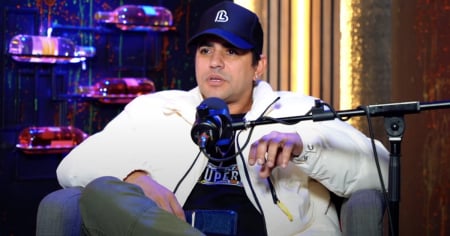The Cuban presenter Alexander Otaola sent a reassuring message to his compatriots in the United States who fear deportation, following President Donald Trump's granting of new powers to the Immigration and Customs Enforcement (ICE) to expedite the removal of immigrants in an irregular situation.
In his program, Otaola specifically addressed immigrants who are under the immigration statuses of the I-220A and I-220B documents, issued by the U.S. Citizenship and Immigration Services (USCIS), which involve parole or supervision in the country.
In their opinion, "good" Cubans—meaning those who are working, have their insurance and licenses in order, meet the requirements to legalize their situation, and do not commit crimes—should not have to worry.
"You are I-220A, you are I-220B. You have your job, you have completed your paperwork, you are in the process of adjusting your status, you have your license up to date, and your car insurance is current. You have no problems, you will not be deported," he explained.
According to him, those who will indeed be expelled are those who have been to prison, those with criminal records, pimps, traffickers of people or drugs, or anyone who has committed any other crime.
The influencer is convinced that immigrants who have been in the country for a year or two and are "settled" will not have any issues.
"President Trump has said that he is in favor of immigration, legal immigration, and that the United States needs people," he said.
At the beginning of the month, Otaola sparked a new controversy by defining who he believes should be deported without reservation.
"Immigrants who did not come for political reasons should be deported. Those with criminal records, those who declare themselves communists, and those who say that what interests them is opening a business in Cuba and sending a car there," he pointed out.
The presenter stated that those are the ones who should be told "to go back," as they do not qualify for any immigration status, and should be put on boats or planes back to Cuba.
"It must be done without asking permission from the Cuban dictatorship, which is another of the major mistakes that the United States is making," he added.
The former mayoral candidate admitted that although there are "pacts" between both countries, one cannot treat Cuba as if it were a country that functions normally, because it does not.
He also accused the Communist Party of Cuba of using migration flows as a tool for political pressure.
Frequently Asked Questions about the Immigration Status of Cubans with I-220A and I-220B in the United States
What is the difference between forms I-220A and I-220B for Cubans in the U.S.?
The I-220A indicates supervision release and generally does not carry an immediate deportation order, while the I-220B, known as "Order of Supervision," may imply an active or pending deportation order, increasing the risk of deportation for those holding this document.
Why are Cubans with I-220B at greater risk of deportation?
Cuban individuals with I-220B have supervision orders that may include active deportation orders, making them more vulnerable to deportation, especially under stricter immigration policies like those announced by Donald Trump for 2025. This vulnerability is due to the existence of deportation orders that can be executed at any time.
What can Cubans with I-220A or I-220B do to improve their immigration situation?
It is crucial to consult with an immigration lawyer to understand your situation and explore legal options. Keeping all documents updated, attending all immigration appointments, and refraining from committing crimes are essential steps to avoid complications.
How does the Cuban Adjustment Act affect Cubans with an I-220?
The Cuban Adjustment Act allows Cubans to apply for permanent residency after one year in the U.S. However, those with I-220 face uncertainties, as this form is not recognized as an official admission, complicating the status adjustment process.
Filed under:
